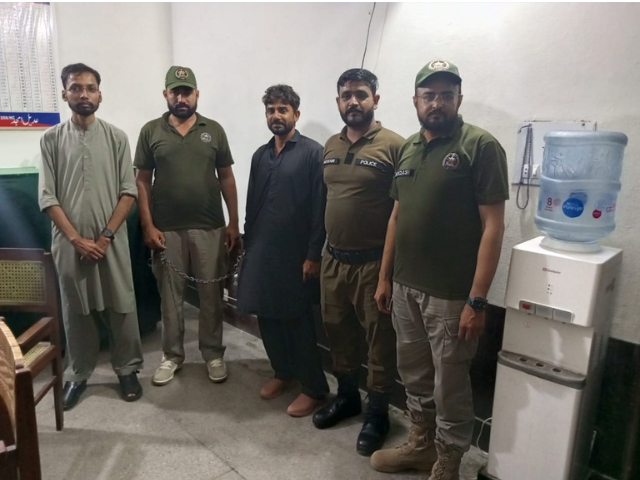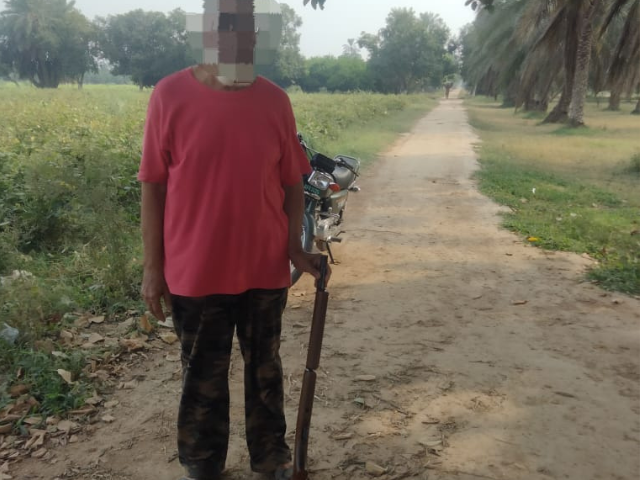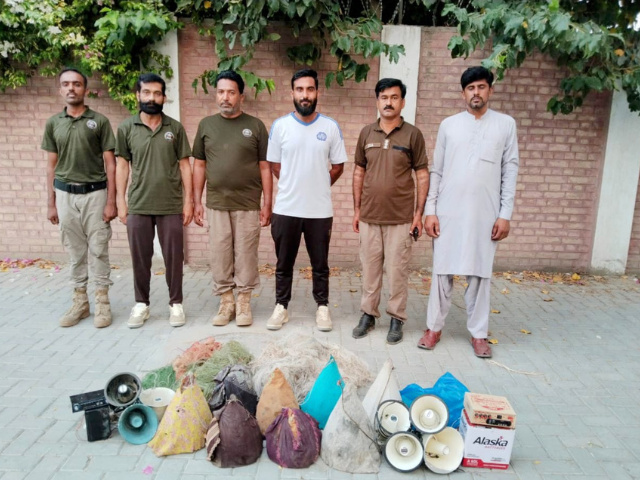Punjab wildlife department lodges over 125 FIRs against illegal hunting
Almost 300 wild birds rescued from poachers, released back into natural habitats

Authorities in Punjab have intensified their crackdown on illegal hunting during the ongoing falcon and quail hunting season, registering more than 125 First Information Reports (FIRs) in various police stations across the province.
According to a spokesperson for the Punjab Wildlife Rangers, over 300 wild birds have been rescued from poachers and released back into their natural habitat.
The official noted that enforcement actions in Lahore, Rawalpindi, Faisalabad, Jhang, the Salt Range, and South Punjab revealed most offenders were engaged in unlawful netting and trapping of quails, partridges, and parrots.
Deputy Chief Wildlife Ranger Punjab Dr Ghulam Rasool has revealed that falcons and quails are among key migratory bird species arriving in Pakistan from early August.

Punjab Wildlife Department officials detain a suspected poacher during an action against illegal hunting of falcons and quails. Photo: Express
These birds are typically found near rivers, lakes, and water channels, making them easy targets during their breeding season when poachers and hunters exploit their vulnerability.
According to Dr Ghulam Rasool, falcons prefer semi-desert and hilly terrains and are commonly used for hunting purposes.
The riverine and hilly areas of Dera Ghazi Khan and Rajanpur, as well as the Salt Range in Sargodha and Khushab, are known habitats of these prized raptors.

A suspected hunter with a seized firearm during Punjab Wildlife Department action against illegal hunting of falcons and quails. Photo: Express
Hunters often employ cruel methods, such as tethering other birds as bait or using nets, to trap them.
Quails, on the other hand, are concentrated in Punjab’s central districts.
Okara, Pakpattan, Sahiwal, and Vehari are major breeding grounds due to their agricultural landscapes, where quail hunting is widespread.
Read: Punjab to enforce 'zero-tolerance policy' against illegal hunting of falcons, quails
Quail farming, particularly in the outskirts of Lahore and Kasur, has also become a commercial activity.
Additionally, cotton and wheat fields in Faisalabad, Jhang, and Toba Tek Singh, as well as farms in Multan and Khanewal, provide natural habitats for quails, making them easy prey for hunters.
Chief Wildlife Ranger Mubeen Elahi emphasized that the operation would continue with “full commitment and force” across the province until illegal hunting is completely eradicated, warning that violators will face strict legal consequences without exception.

Confiscated hunting equipment and suspects presented at Border Military Police Station, Rajanpur. Photo: Express
Mastanir Afzal Lodhi, a leader of the Pakistan Hunters’ Association, alleged that the illegal hunting and transportation of falcons and quails would not be possible without connivance of certain wildlife officials.
He disclosed that falcons captured in Punjab and Sindh are often transported to districts of Khyber Pakhtunkhwa, especially Tank, where they are auctioned.
Selling falcons
In Pakistan’s black market, the illegal price of a falcon can range between PKR 500,000 and PKR 10 million.
Hunters reportedly share photographs of captured falcons in private WhatsApp groups, where bidding takes place.
Many of these birds are ultimately purchased by agents of wealthy hunters from Gulf states.
When Arab falconers travel to Pakistan, they sometimes swap less valuable or low-grade falcons they bring along with high-value birds procured locally.
Moreover, falcons are also smuggled abroad via sea routes.
Notably, in 2020, a Peregrine Falcon fetched around USD 173,000 (650,000 Saudi riyals) at an auction in Saudi Arabia.
In 2021, a rare super white Gyrfalcon was sold for approximately USD 93,347.

Wildlife officials display nets, loudspeakers, and other equipment recovered from illegal hunters in Punjab. Photo: Express
More recently, in 2024, a Peregrine falcon chick was auctioned for USD 106,600 (400,000 riyals), underscoring the extraordinary international demand for these endangered raptors.
The issue carries international significance, as species such as falcons are often targeted by traffickers for lucrative markets in the Middle East, despite being protected under the Convention on International Trade in Endangered Species of Wild Fauna and Flora (CITES).
Conservationists warn that unchecked poaching not only threatens biodiversity but also undermines Pakistan’s international obligations under global wildlife treaties.
With migratory bird season currently at its peak, wildlife experts underline that continued vigilance is crucial to safeguarding species that travel across continents, many of which are already under pressure due to habitat loss and climate change.




















COMMENTS
Comments are moderated and generally will be posted if they are on-topic and not abusive.
For more information, please see our Comments FAQ